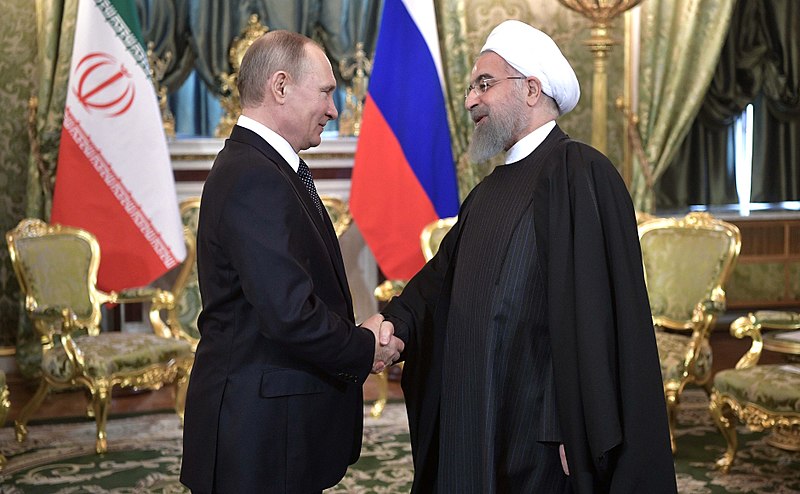 Photo Credit: www.kremlin.ru
Photo Credit: www.kremlin.ru
Russia and Iran’s Alliance: Underestimated and Deepening
In 2015, it looked as though the regime of Syrian President Bashar al-Assad was finally exhausted by four years of civil war, with both it and neighboring Iraq at the mercy of the rapidly expanding Islamic State (IS). Now, in 2017, the question is what the region will look like once IS and the moderate opposition in Syria are defeated. This drastic turnaround in events is due in part to the combined military assistance of Russia and Iran.
In addition to providing support to the Iraqi government in their fight against IS, Iran has been providing direct military support for Assad- a longtime ally -since the uprising’s early days. And Russia’s dramatic entry into the conflict in 2015, providing air and battlefield support to Assad’s exhausted army, has been a life-saver for his regime. Now with the opposition shrinking and IS on the run in both Iraq and Syria, the question is what the post-war Middle East will look like. And it looks increasingly likely that Iran and Russia will play a key role in that new order.
Many experts have been quick to downplay the prospects of deepened cooperation between Russia and Iran. This is not unfounded, as Iran and Russia have a long and difficult history. But even those who doubt the alliance differ in why it’s destined for failure. Some hypothesize that it can never go far enough, due to cautious attitudes rooted in historical mistrust and competition. Others have asserted that Russia has little influence over Iran, and the two will naturally drift apart over time. Still others claim it is fragile because it is based only on hostility to the US, with Iran dependent on Russia. In that vein, Israeli Prime Minister Benjamin Netanyahu recently held his sixth meeting with Russian President Vladimir Putin in two years, in the hope of persuading Russian to rein in its partner.
Despite his efforts, Netanyahu went home empty handed, fighting off claims that Putin blatantly rejected his request while affirming that Tehran is Russia’s primary regional ally. It appears the Iran-Russia relationship may be more robust than experts had thought.
This strengthening alliance is due in part to deepening economic cooperation. Trade between Russia and Iran has roughly doubled in the last year, with Iran claiming trade with Russia could soon surpass $10 billion. These new economic and commercial ties are changing the entire nature of Russo-Iranian cooperation, strengthening and deepening their alliance as the nations become more interconnected across numerous fields.
But even without trade ties, for the near future, Russia and Iran simply have too much in common to be divided. As Chris Kozak of the Institute for the Study of War wrote in February: “There is nothing unnatural, artificial, or inherently temporary about the coalition between Russia and Iran. Their relationship rests on a deep foundation of common strategic objectives and interests.” Their shared goals for the region include boosting Assad, seducing Western allies like Egypt and Turkey, weakening Western institutions, and reducing or destroying the West’s regional influence.
The longevity and future of the Russian-Iranian alliance is still debatable, but despite hopes and claims to the contrary, it’s not going anywhere soon. The partners have not wasted time making moves for future. As Iraq’s Prime Minister Haider al-Abadi declares victory against a waning IS in the strategic town of Tal Afar, Iran has worked to extend cooperation and exert influence over its neighbor while Iraq has also sought deeper cooperation Russia in multiple areas. Meanwhile, Prime Minister Netanyahu has accused Iran of building a missile factory in Syria as part of a plan to dig in and surround Israel, as well as claiming Russia is defending the factory with its advanced S-400 surface-to-air missile system.
The U.S. has largely been silent on the emerging Russo-Iranian alliance, saving their criticisms for the Iran Nuclear Deal. American policymakers should take this seriously. The prospect unsettles US allies like Israel, and Russia and Iran could attract other longtime U.S. partners like Egypt to their team. Washington should reassure its regional allies that they can count on its support and that it is taking these developments– and their concerns –seriously. The U.S. needs its Middle Eastern partners to feel confident in themselves and U.S. leadership to unite and counter rising Russo-Iranian influence. However, this would also mean supporting a Saudi-led, predominately Sunni Muslim alliance, which has already made questionable decisions in Yemen and Qatar and could further aggravate Sunni-Shia tensions. This is a potentially dangerous move. But with no other obvious bloc to counter Russia and Iran, the U.S. may have no choice. If the U.S. continues its inaction and disinterest, it will only provide an opportunity for Russia and Iran to further extend their reach and deepen their ties at U.S. expense.





